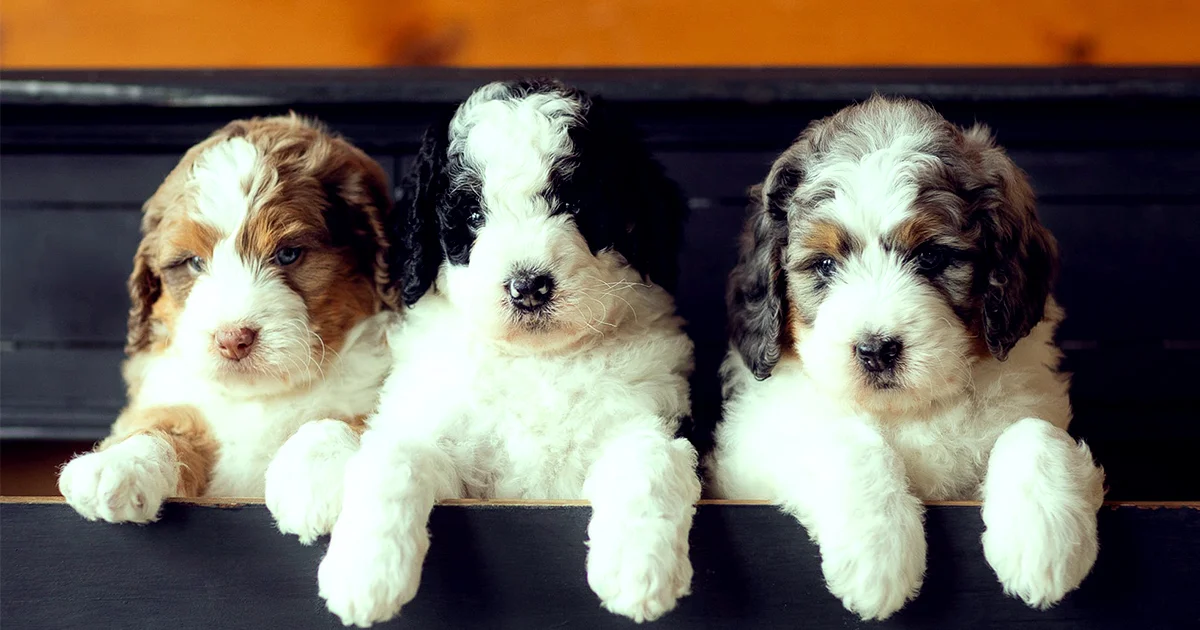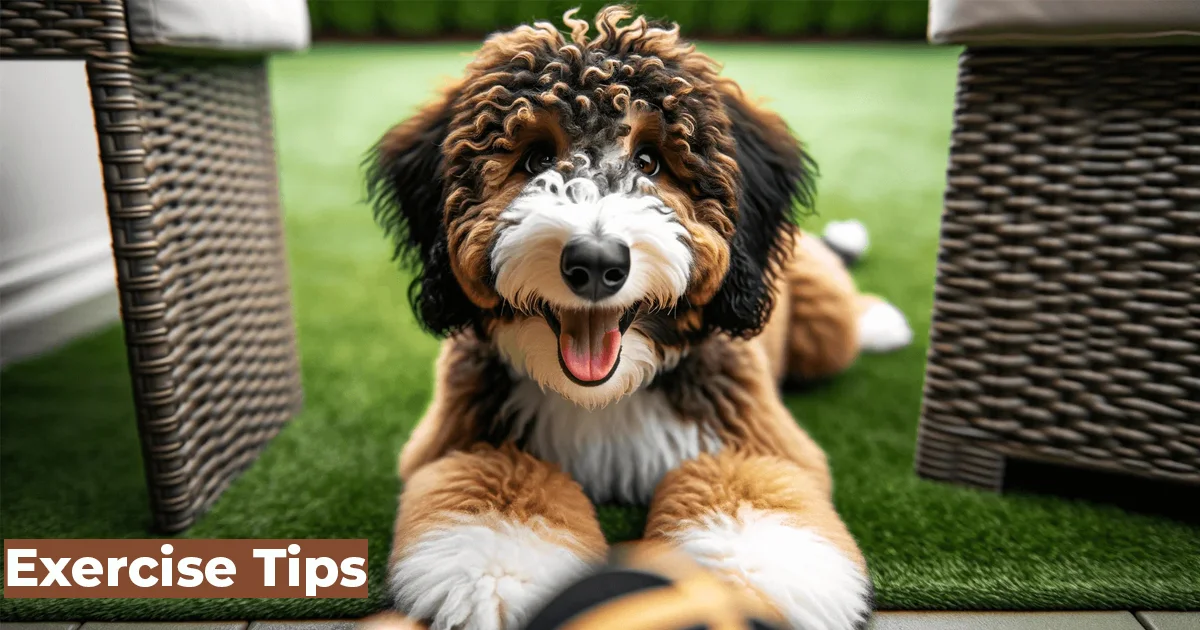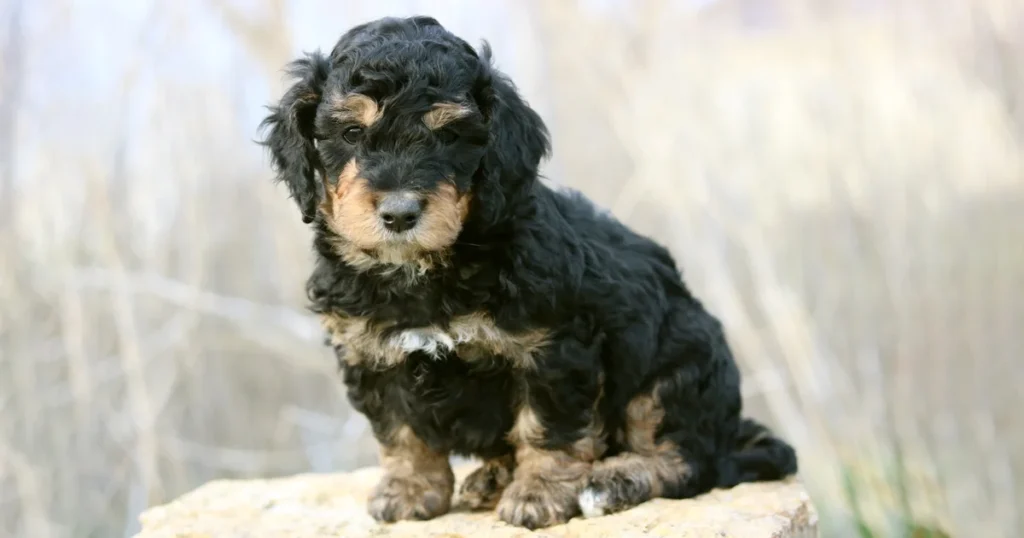The F1B Mini Bernedoodle is an excellent choice for families in search of a loving, hypoallergenic companion, blending 75% Poodle with 25% Bernese Mountain Dog traits. These mini bernedoodle full grown dogs typically offer a more hypoallergenic coat, making them a prime selection for homes with allergy concerns, and are known to shed less than their F1 counterparts. Additionally, their size is perfect for various living spaces, as they generally do not surpass 50 pounds.
Choosing an F1B Mini Bernedoodle puppy can wonderfully enrich family life, offering a spectrum of coat colors from black and brown to the eye-catching tri-color Mini Bernedoodle, and textures ranging from loose wavy to curly plush. With options including the Tiny, Mini, or Standard Bernedoodle, finding the right fit for your home is easy, and this guide will help you understand their care, temperament, and grooming to ensure a joyful life with your miniature bernedoodle. Plus, considering the mini bernedoodle lifespan, you’re looking at years of companionship.
Understanding F1B Mini Bernedoodles
Grasping the distinct combination of traits in F1B Mini Bernedoodles is crucial for families pondering the addition of this crossbreed to their home. Notably, when they reach mini bernedoodle full grown status, they embody a perfect balance of size and personality.
Background and Genetics
F1B Mini Bernedoodles are created by breeding a Miniature Poodle with an F1 Bernedoodle, which is a mix of a Bernese Mountain Dog and a Poodle. This specific crossbreeding process is what defines an f1b bernedoodle.
This crossbreed, the F1B Mini Bernedoodle, boasts a genetic makeup of 75% Poodle and 25% Bernese Mountain Dog, merging the Poodle’s smarts and low-shedding coat with the Bernese’s amiable disposition. As they mature into mini bernedoodle full grown dogs, their desirable traits become even more pronounced.
Physical Attributes
In terms of stature, these dogs typically stand between 17 to 22 inches tall and weigh from 25 to 65 pounds, presenting a size that is manageable for most households and aligns with the mini bernedoodle full grown dimensions.
Their coats, which are often curly or wavy, reflect their higher Poodle lineage, making them more hypoallergenic and less prone to shedding compared to their F1 counterparts, a characteristic that is especially appealing to those considering an f1b bernedoodle.
Coat Colors and Care
Miniature Bernedoodle enthusiasts will be delighted by the F1B Mini Bernedoodles’ array of coat colors, which include classic black, rich brown, the eye-catching tri-color, and even the rare Phantom or chocolate hues.
To ensure a healthy coat and a Mini bernedoodle lifespan free from matting, regular grooming is essential, with professional grooming services highly recommended to manage their luxurious curls.
Recognizing the key traits of F1B Mini Bernedoodles enables families to anticipate the care these pets require, ensuring they grow into a mini bernedoodle full grown that’s both loving and versatile.
Health and Lifespan
Consistent veterinary attention is vital for an F1B Mini Bernedoodle’s well-being, with a focus on mini bernedoodle lifespan and bernedoodle lifespan from the outset.

Puppies should receive frequent check-ups, especially in their formative year, to complete vaccinations and overall health evaluations.
Lifespan
Typically, an F1B Mini Bernedoodle is expected to enjoy a bernedoodle lifespan that spans from 10 to 12 years, offering a decade or more of companionship.
Certain studies indicate that due to hybrid vigor, which may contribute to a more robust constitution less susceptible to inherited conditions, the bernedoodle lifespan could extend from 14 to 18 years.
Common Health Concerns
F1B Mini Bernedoodles might face health challenges linked to their Bernese Mountain Dog and Poodle lineage, including hip and elbow dysplasia, heart conditions, epilepsy, cancer, ocular issues, skin allergies, and gastrointestinal disorders, all of which can influence the bernedoodle lifespan.
Owners considering a Bernedoodle should be informed about specific health conditions such as Hip and Elbow Dysplasia, Progressive Retinal Atrophy (PRA), Allergies, and Gastric Dilatation-Volvulus (GDV), which can influence the bernedoodle lifespan.
Temperament and Personality
F1B Mini Bernedoodles, when mini bernedoodle full grown, are adored for their captivating personalities and compatibility with family life, making them excellent companions.
Affectionate Companions
Exhibiting a loving nature, F1B Mini Bernedoodles, once mini bernedoodle full grown, flourish with human interaction and forge deep connections with their families, displaying a special fondness for children and the elderly, often serving as exceptional therapy dogs due to their calm temperament.
Intelligence and Trainability
The F1B Mini Bernedoodles, known for their high intelligence inherited from Poodle ancestors, are relatively straightforward to train, especially when training commences early. Their sharp minds and the ease of training make the mini bernedoodle full grown dogs a joy to work with.
Energy and Exercise
- Mini bernedoodle full grown dogs are brimming with energy, making daily walks and playtime essential for sustaining their physical and mental health. Regular activity is key to their overall well-being.
- An exercise routine that includes moderate activity, typically ranging from 30 to 60 minutes per day, is optimal for a mini bernedoodle full grown to maintain a state of health and happiness.
Socialization Needs
- For mini bernedoodle full grown dogs, early socialization is imperative to mature into well-adjusted adults. Exposing them to a variety of people, pets, and settings fosters their confidence and aids in their development into sociable companions.
- It’s important to monitor the reactions of mini bernedoodle full grown dogs during social interactions to ensure they remain comfortable and do not succumb to anxiety or discomfort.
Grooming and Care
Caring for your F1B Mini Bernedoodle’s coat is an essential aspect of their overall well-being, especially as they approach their mini bernedoodle full grown size. Here’s how to keep their coat healthy and looking its best.
Brushing and Bathing:
- To ensure your mini bernedoodle full grown companion maintains a healthy coat, brush your Bernedoodle 2-3 times per week using the appropriate brush—slicker, pin, or bristle—to prevent matting and tangling.
- Bathing your mini bernedoodle full grown pet should occur once every couple of months or when they get particularly dirty. Focus on using quality shampoo and conditioner to maintain coat health and keep their appearance at its best.
- After bathing, thoroughly dry their coat using a high-power dryer, especially keeping the face dry to maintain any white coloring. This step is crucial for a mini bernedoodle full grown dog to prevent skin issues and maintain their distinctive look.
Types of Coats and Grooming Needs:
- Wavy coats, known as Fleece, shed minimally and require less frequent brushing.
- Straight coats, which may shed more and resemble the Bernese Mountain Dog, demand more regular brushing to avoid matting as your mini bernedoodle reaches full grown status.
- Curly coats, or Wool, are the most hypoallergenic and, as your mini bernedoodle grows to full grown size, they require routine grooming to prevent tangles and maintain their soft, hypoallergenic quality.
Haircuts and Professional Grooming:
- Popular haircuts for mini bernedoodle full grown canines include the Poodle Cut, Teddy Bear Cut, and Lamb Cut. These styles can be achieved at home or by a professional groomer, catering to the unique coat of a Bernedoodle.
- Professional grooming sessions for a mini bernedoodle full grown typically cost between $50-$100 and are recommended to be scheduled every 3 to 6 months to maintain their distinctive coat.
- For home grooming of a mini bernedoodle full grown, it’s important to assemble essential tools such as clippers, brushes, combs, and nail clippers. Start with less sensitive areas to get your dog comfortable with the grooming process.
Regular grooming sessions for your F1B Mini Bernedoodle not only keep them looking sharp but are also crucial for their overall health. Such care for a mini bernedoodle full grown can strengthen your bond and ensure they stay comfortable and joyful.
Training and Socialization
Training and socialization are crucial for any puppy, particularly for the intelligent and affectionate mini bernedoodle full grown. These dogs thrive with positive reinforcement and consistent training efforts to become well-mannered and sociable adults.
Essential Training Steps:
- Start Early: Capitalize on the critical learning period between 0 to 16 weeks old for your mini bernedoodle full grown, when they are most open to new experiences and training.
- Basic Commands: Start training your mini bernedoodle full grown with simple commands like ‘sit,’ ‘stay,’ ‘come,’ and ‘fetch,’ using treats and praise to encourage and reinforce good behavior.
- Crate Training: Transform the crate into a cozy sanctuary for your mini bernedoodle puppy, outfitting it with their cherished blankets or toys, and progressively extend the duration they spend inside to avert any stress as they grow to their full size.
- Potty Training: Cultivate a consistent routine and clear commands for potty breaks to curtail accidents and foster harmonious living with your mini bernedoodle as it matures.
- Advanced Skills: Once your mini bernedoodle has a grasp on the basics, consider advanced training to enhance their off-leash capabilities, agility, or therapy skills as they approach their full grown stature.
Socialization Techniques:
Daily Interaction: Provide your mini bernedoodle with daily social encounters, allowing them to engage with new people, animals, and diverse settings, which is crucial as they grow towards becoming a full grown companion.
Monitor Behavior: Monitor your mini bernedoodle’s behavior during socialization to promptly address any discomfort or anxiety, ensuring they become a well-adjusted full grown dog.
Address Challenges: If your mini bernedoodle exhibits stubbornness or excessive barking, address these behaviors with understanding and patience, identifying the causes as they progress towards their full grown phase.
Training Schools and Professional Help
Puppy Classes: Attend puppy training classes that focus on essential commands, manners, and socialization.
Professional Schools: For teaching more intricate skills to your mini bernedoodle, seek out esteemed training schools that offer specialized programs in trick training, which can be beneficial as your puppy reaches full grown size.
Behavioral Issues: When mini bernedoodle full grown dogs exhibit behavioral challenges, like jumping or chewing, seeking professional training may be the key to effectively resolving these issues.
Exercise Needs
Maintaining the health and happiness of a mini bernedoodle full grown dog involves understanding their specific exercise requirements, which are outlined below:

Daily Exercise Routine: A mini bernedoodle full grown dog should engage in 30-60 minutes of exercise daily, which can be conveniently split into 1-3 sessions to fit their and your schedule.
- It’s crucial to customize the exercise routine for your mini bernedoodle full grown companion, taking into account their age, size, and personality, as these factors significantly impact their energy levels and exercise needs.
Puppy Exercise Guidelines: For mini bernedoodle full grown puppies, exercise should be gentler, adhering to the rule of 5 minutes of activity per month of age, up to three times daily, to suit their developing bodies.
- This helps prevent overexertion and supports healthy growth and development.
Types of Activities:
- F1B Mini Bernedoodles, when fully grown, relish a mix of activities such as walking, running, hiking, and swimming. These not only keep them in good physical shape but also offer valuable mental stimulation.
- Mini Bernedoodle full grown dogs, typically under one year old, exhibit higher energy levels and thus demand more frequent and vigorous exercise to stay fit and happy.
- For those residing in apartments or with limited outdoor space, engaging in structured exercise such as using a flirt pole can be an effective way to help a mini Bernedoodle full grown dog burn off their abundant energy.
It’s crucial to recognize that regular exercise is imperative not only for physical health but also for the mental well-being of a dog. Daily walks and playtime are essential for mental stimulation and socialization, contributing to the overall health of a mini Bernedoodle full grown. Exercise also serves as a preventive measure against weight gain, especially important for active breeds like the F1B Mini Bernedoodle, by keeping them active and engaged in enjoyable activities.
Choosing an F1B Mini Bernedoodle Puppy
Embarking on the journey to select an F1B Mini Bernedoodle puppy necessitates partnering with bernedoodle breeders who prioritize the puppy’s development and health. Here’s a guide to assist you in making a well-informed choice.
Reputable Breeder Checklist:
- Look for breeders who follow strict breed standards and provide a health guarantee.
- Ensure breeders prioritize early neurological stimulation, socialization, and affection for the puppies.
- Conduct thorough research on bernedoodle breeders such as Brian and Laura Sheets for comprehensive information on puppy care and to address any inquiries you might have.
- Reach out to reputable breeders like Central Illinois Doodles who provide a genetic health guarantee, ensuring coverage for life-threatening genetic issues during the puppy’s first two years.
Puppy Selection Considerations:
- When considering a mini Bernedoodle full grown, analyze factors such as color, energy level, size, and personality to find a match that complements your lifestyle and experience with dogs.
- For families with small children, selecting a mini bernedoodle full grown for its moderate temperament is ideal.
- Active households or those with older children might find a mini bernedoodle full grown with high energy and lower dominance to be the perfect match.
- First-time dog owners should consider a middle-of-the-road or softer puppy for easier management.
Pre-Adoption Preparation:
- Gather essentials such as food, bowls, ID tags, collar/leash, bed/crate, and grooming supplies.
- It’s crucial to have your new puppy vet checked within the first three days of bringing them into your home.
- Understand the timeline: breeding takes 4 months, followed by 63-65 days of gestation, and then puppies are ready to go home at 8-10 weeks—don’t forget to make your reservation early.
- If you’ve placed a deposit on an upcoming litter, be prepared to join the waitlist, which can span 8-24 months.
Choosing Your Puppy:
- Stay informed through updates, often provided by breeders in groups like the Utahbernedoodle Owners Facebook group, especially when anticipating the growth of your mini bernedoodle full grown.
- Decide whether to adopt from the current litter or wait for a future litter when the puppies are 1-2 weeks old.
- Be prepared to select your mini bernedoodle full grown puppy when they are between 4-5 weeks old to secure the choice that best suits your preferences.
- If possible, visit the puppy to gauge its temperament and sociability, which are key traits of a mini bernedoodle full grown, and inquire about its initial socialization experiences.
Choosing an F1B Mini Bernedoodle puppy goes beyond acquiring a pet; it’s about welcoming a new, full-grown mini bernedoodle into your family. Invest time in research, be thorough in your preparations, and ready your home to facilitate a seamless transition for all.
Conclusion
Our journey through the traits of the F1B Mini Bernedoodle reveals why they are such an endearing choice for a family pet. Their non-shedding coat, amiable nature, and smarts create a companion perfect for both lively play and relaxing snuggles. Aspiring owners can anticipate a bond with their mini bernedoodle full grown that’s rich in loyalty, happiness, and love.
Frequently Asked Questions (FAQs)
- Are F1B Mini Bernedoodles hypoallergenic?
While no dog breed is completely hypoallergenic, F1B Mini Bernedoodles often have low shedding coats, making them suitable for individuals with allergies. - How much exercise do F1B Mini Bernedoodles need?
F1B Mini Bernedoodles benefit from daily exercise such as walks, playtime, and mental stimulation activities to keep them healthy and happy. - Do F1B Mini Bernedoodles get along well with children?
Yes, F1B Mini Bernedoodles are typically gentle and affectionate towards children, making them great family pets. - What is the lifespan of an F1B Mini Bernedoodle?
On average, F1B Mini Bernedoodles have a lifespan of around 12 to 15 years when provided with proper care and nutrition. - Do F1B Mini Bernedoodles require professional grooming?
While regular grooming at home is sufficient for most F1B Mini Bernedoodles, occasional visits to a professional groomer for trims and maintenance may be necessary.


